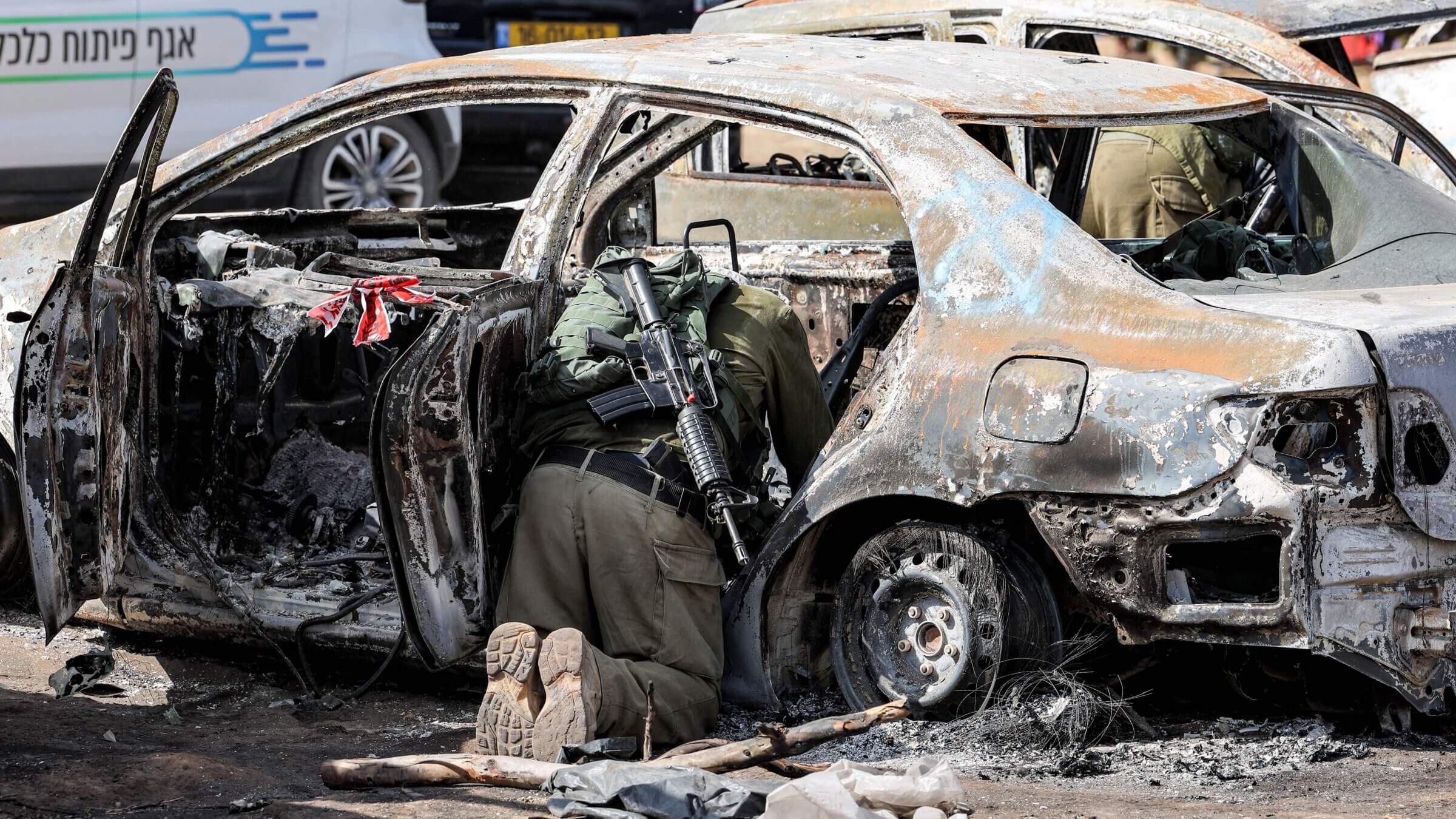As Hamas supporters deny rapes, investigation raises questions about whether forensic evidence from Oct. 7 was collected
Such evidence would bolster accounts by witnesses and recovery workers to counter denials by Hamas supporters

An Israeli army soldier searches and collects forensic evidence through a torched vehicle at the site of the Oct. 7 attack on the Supernova desert music festival. Photo by Jack Guez/AFP via Getty Images
Editor’s note: This story includes graphic details of sexual atrocities.
An investigation by The Times of Israel raises questions about whether forensic evidence of rape was collected from victims of Hamas’ Oct. 7 attacks. Such evidence would bolster eyewitness accounts and recovery workers’ reports of rape to counter denials by Hamas supporters and other propagandists.
Physical evidence required to meet legal standards for charges of rape decomposes within a week, so if rape kits were not administered immediately following the attacks, that evidence is gone. The Times of Israel reported that it is “not clear” if “rape kits were ever collected,” saying that a police spokesperson refused to answer the question.
Recovery workers interviewed by The Times said they found ample evidence of rape, including numerous victims stripped and bloody from the waist down, with mutilated genitals, broken pelvises and broken legs. Those gruesome observations were consistent with accounts of sexual assault provided by eyewitnesses and by Hamas terrorists who were captured and interrogated by Israeli authorities. The Hamas gunmen’s confessions included “having sex with dead bodies” in order “to dirty them.”
But rape kits were not routinely administered by recovery teams prioritizing the identification of 1,400 corpses, many of which had been mutilated, burned or blown to bits, The Times found. Bodies that could be identified were returned to families and prepared for burial as fast as possible; some 200 remain unidentified.
A campaign of denial
Despite “significant evidence of systematic sexual abuse,” The Times said, “morgue officials have not designated individual cases as rape because of a lack of court-compliant physical proof.” The decision to “not use time-consuming crime scene investigation protocols to document rape cases has, however, fueled international skepticism over Hamas’s sexual abuse of victims.”
In addition to the rape denial, many have also denied the Oct. 7 attacks happened at all. Israelis and others have drawn comparisons between this and Holocaust denial.
The Times said that “skepticism” comes amid attempts by pro-Palestinian activists and others to downplay the “scale of Hamas’ atrocities” and to condemn Israel’s war on Gaza, which Gaza health officials say has killed more than 10,000 people.
Though Israeli officials have repeatedly stated that Hamas terrorists committed rape along with murder and kidnapping, the government has “not released explicit footage or pressed rape survivors to share their stories,” The Times said. This has led “many media outlets” around the world to frame accounts of rape on Oct. 7 “as a claim rather than a fully substantiated fact. Social media is now awash with memes parodying ‘not believing women’ who are Israeli or Jewish.”
On Wednesday, Israeli police released a horrific account by a survivor who witnessed, from her own hiding place, a young woman being gang-raped, then murdered. That account was immediately met with comments online dismissing the report as “fantasy,” asking why rape kits and other physical evidence have not been made public, and suggesting that the Israelis themselves were the perpetrators.
The Times interviewed several workers who “had firsthand encounters with bodies they perceived to be abused” — for example, a woman shot in the head, found face-down on a bed, naked from the waist down. The worker who found her did not take photos of the scene, but said that others did photograph victims they believed had been raped and sent those pictures to authorities. The Times said it was unable to obtain such images from government sources who cited victim privacy and the need to protect intelligence sources.




















